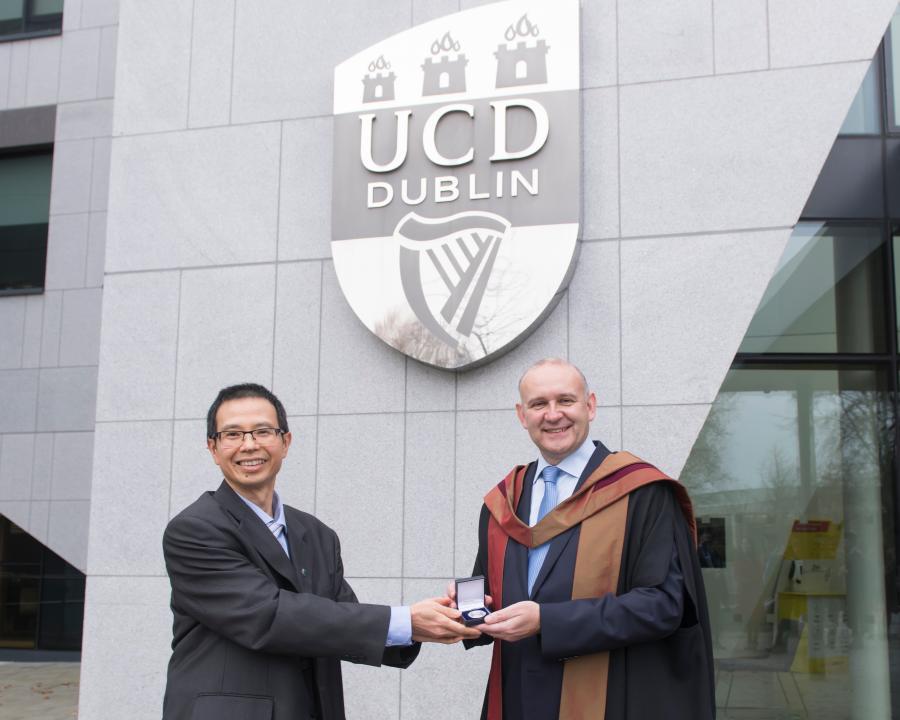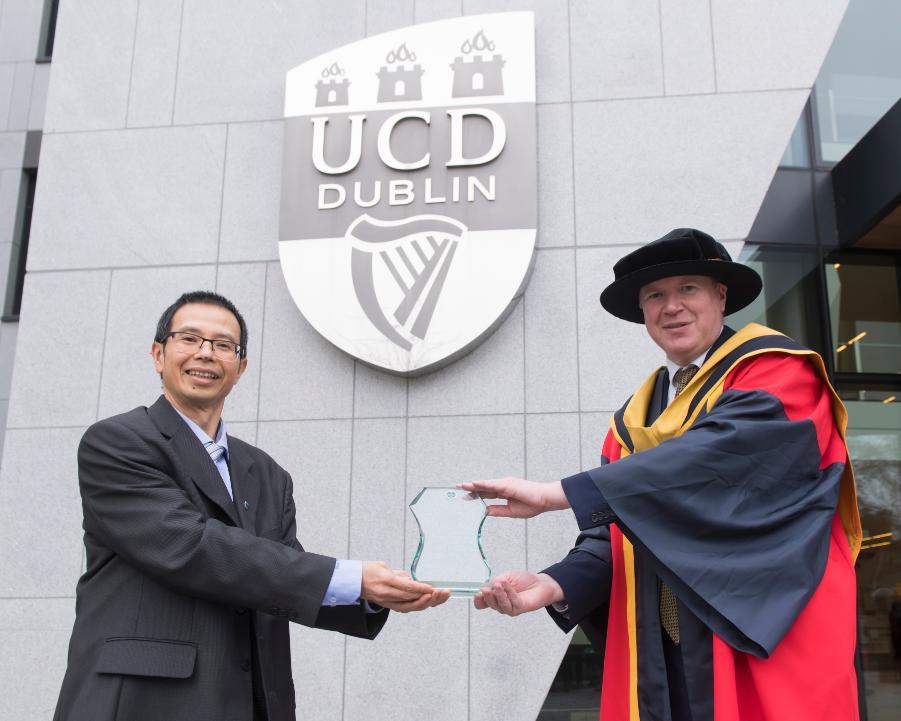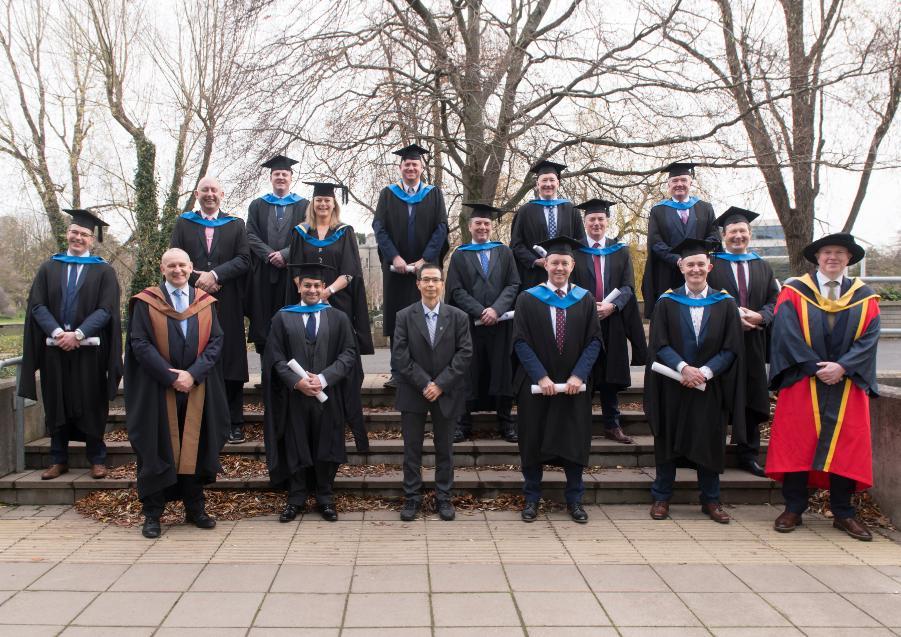Congratulations to the Class of 2021 - MSc Forensic Computing & Cybercrime Investigation
News
- CS News 2025
- SECURENET 2025
- EoI for Postdoctoral Fellowships 2025
- “Back to the Future” Advanced AI Careers Evening
- SOLARIS Shortlisted for Best Research Project at the 2025 Education Awards
- First global carbon neutral conference in ICT for Sustainability
- ARMOR: Advancing AI-Driven Security for 6G Open RAN Networks
- AI research and education at UCD and career opportunities in Ireland
- Political Bias on X before the 2025 German Federal Election
- A new Book co-authored by UCD CS Assoc. Prof. Madhusanka Liyanage Explores the Foundations and Applications of Mobile Edge Computing
- UCD NetsLab Leads a Global Consortium to Tackle 6G Security Challenges
- First students conferred with MSc in Cybersecurity
- Second Workshop on the Responsible Use of Generative AI in Research
- First BDIC Conference on Computer Science and Electrical/Electronics Engineering
- Paul Gillen - global leader in the fight against cyber crime
- CS students awarded Naughton Foundation Scholarships
- First Workshop on the Responsible Use of Generative AI in Research
- Dr Brett Becker (1976 - 2024)
- UCD Computer Science Researchers Receive ReCLAIM Award for GenAI Project
- MSc Cybersecurity Research Project Presentations 2024
- UCD BSc Computer Science Conferring 2024
- UCD NetsLab Launches ORAN Testbed to Advance Security and Privacy in Beyond 5G and 6G Networks
- UCD CS Netslab researchers in a global collaboration to bolster Zero Touch security and privacy for 6G networks
- UCD STEM Early Career Researchers Symposium
- EoI for Postdoctoral Fellowships 2024
- CS start-up a finalist in VentureLaunch Accelerator Programme
- University College Dublin Joins ROBUST-6G Project
- Cyberwise Cyber Security Shared Learning Day
- 2nd Summit on Security and Privacy in Future Mobile Networks (SECURENET) 2024
- Message from the Head of School
- Ulysses Medal Awarded to Professor Geoffrey Hinton: The Godfather of AI
- UCD CS academics invited to organise prestigious Dagstuhl seminars
- UCD College of Science Women in Science Mentoring Awards
- PhD Poster Event 2024
- “Back to the Future” Software Engineering Evening
- Improving resilience to the threat of coastal flooding
- Alumnus In Conversation - Fergal Reid, VP of AI at Intercom (PhD 2013)
- Computer Science Summer School
- Welcome to CS News 2023
- EoI for Postdoctoral Fellowships
- EU MSCA SE RE-ROUTE Project Kicks Off to Design Futuristic Multi-Modal Transportation Platform
- PhD Poster Event
- UCD wins at AI Ireland AI Awards
- UCDCS Athena SWAN Award
- Jan Łukasiewicz
- International Men’s Day
- 1st Year BSc Halloween Networking Event
- Ada Lovelace Energy Hackathon
- 5G for digital healthcare in COVID-19
- UCD CS Faculty Elected Vice Chair of ACM SIGCSE
- CS Big Data project for strategies to combat childhood obesity recognised for its innovation potential
- Welcome to CS News 2022
- UCD CS to host the 27th ACM Innovation and Technology in Computer Science Education
- UCD Computer Science Success in SFI Frontiers to the Future
- Why study Computer Science at UCD?
- CAMEO project receives funding from the Disruptive Technology Innovation Fund
- Congratulations to the Class of 2021 - MSc Forensic Computing & Cybercrime Investigation
- Computer Science Colleagues’ success in Interdisciplinary Research Scheme
- ML Labs Annual Newsletter
- Seagate CORTX Challenge
- UCD Academic awarded the 2021 Beijing Great Wall Friendship Award
- Recent funding successes and industry collaborations
- EU H2020 SPATIAL project
- recsyslabs - privacy preserving personalisation for publishers
- Congratulations to our recent PhD graduates
- UCD In Conversation: Cybercrime causes, trends, and prevention
- CS researchers partner in three successful Disruptive Technologies Innovation Fund projects
- Welcome to CS News, the new UCD CS magazine
- Congratulations to our recent PhD and research MSc graduates
- New book showcases digital forensic research by UCD law enforcement graduates
- Training the next generation of Computer Scientists
- Industry Partnership Event to showcase new research on using machine learning
- Poems that Solve Puzzles: The History and Science of Algorithms
- A welcome to incoming first year Computer Science students
- Zoom for Thought with Prof. Muthoni Masinde
- iPROCEEDS-2: Starting of the long-distance master programme on forensic computing and cybercrime investigation
- Short Term Contract Positions Opportunities
- Most Influential Paper Award at the 28th International Requirements Engineering Conference
- From the School of Medicine in partnership with the School of Computer Science
- 2nd Workshop on Implementing Machine Ethics on 30th June
- CeADAR receives Enterprise Ireland Funding for a new Supercomputer
- Assistant Professor Brett Becker awarded Research Fellowship
- UCD CS Masters Student wins prestigious Intel Student Scholarship
- Navigating COVID19 data with a little help from a tame data scientist
- PhD Positions
- UCD Computer Science Project Nominated for Two Education Awards
- Vacancies - Lecturer/Assistant Professor in Computer Science (x2)
- Ad Astra Fellows - Applications to Computer Science
- CALL OPEN - PhD Scholarships 2020 in Machine Learning
- Commissioner of An Garda Síochána visits the School of Computer Science for Conferring
- Computing Education Group SIGCSEire to launch in UCD on December 11th
- UCD Computer Science wins over €34m in Research Grants in 2018-19
- UCDCS Best Short Paper award 13th ACM Conference on Recommender Systems (RecSys)
- CS Sparks Programme
- CS Sparks

Congratulations to the Class of 2021 - MSc Forensic Computing & Cybercrime Investigation
In December, UCD held in-person conferring ceremonies in the O’Reilly Hall, for the first time since the pandemic began.
This year, 170 students graduated with the MSc in Forensic Computing & Cybercrime Investigation. This is a distance learning programme for law enforcement officers. Students are all working full time while they study.
22 members of the Irish police force, An Garda Síochána, and 12 from the Irish Defence Forces graduated with the MSc this year. International graduates work in law enforcement in 12 other countries: Canada (18), Denmark (1), Germany (3), Lebanon, Luxembourg (2), Netherlands (21), Singapore (2), Switzerland (3), Trinidad & Tobago (2), UK (8) and USA (4). 14 graduates from Romania received financial support from the EEA and Norway Grants fund which aims to contribute to the reduction of economic and social disparities in the European Economic Area and to strengthen bilateral relations between countries. Students on this programme make valuable international law enforcement contacts that can help to investigate transnational organised crime.
An Garda Síochána Postgraduate Certificate in Fraud and Economic Crime Investigation
As well as the Masters graduates, 50 Garda officers were conferred with the UCD Graduate Certificate in Forensic Computing and Cybercrime Investigation (financial fraud and ecrime stream).
This certificate course is for officers of An Garda Síochána specialising in Fraud and Economic Crime Investigation. The first cohort completed this course in 2017. The course is delivered by the UCD Centre for Cybersecurity & Cybercrime Investigation.
The FCCI programme helps law enforcement officers to investigate crimes by undertaking forensic analysis of digital devices including computer systems, networks and mobile devices, and to present the evidence in court so as to convict perpetrators and bring justice for victims.
Graduates include officers from police and defence forces, as well as from government ministries and agencies, tax and revenue, competition and regulatory organisations, national security and intelligence agencies, international law enforcement agencies such as Europol, Interpol, Organization for Security and Co-operation in Europe (OSCE), Organisation for the Prohibition of Chemical Weapons and EU Monitoring Missions.
2021 MSc FCCI Prize Winners
The winner of the 2021 An Garda Síochána Commissioner’s medal is Shuo Yan who is a forensic Investigation Specialist with UNHCR, the UN Refugee Agency. He also receives a UCD School of Computer Science prize along with the runner-up Benjamin Braendle who is a Cybercrime Instructor with the Hochschule für Polizei Baden-Wuerttemberg in Germany. The winners are selected on the basis of their Grade Point Average and the quality of their dissertation. Neither the prize winner or the runner up were able to attend on the day. Winner Shuo Yan nominated Course Director Assist. Prof. Dr Nhien-An Le-Khac to receive his award on his behalf. Later in the day, we convened a short informal Zoom meeting to congratulate the winners with the Head of School Assoc. Prof. Chris Bleakley and Dean of Science Professor Jeremy Simpson joining in, along with the Course Directors Assist. Prof Nhien-An le-Khac and Assist. Prof Mark Scanlon.
(opens in a new window)Watch a recording of the call here (8 minutes, with comments from prize winners reflecting their personal opinions and experience, and not that of their employer).

Dr Nhien-An Le-Khac accepting Shuo Yan’s prize on his behalf from the UCD Dean of Science Professor Jeremy Simpson.

Head of School of Computer Science Assoc. Prof. Chris Bleakley presented the UCD School of Computer Science prize to this year’s MSc graduate with the highest GPA and best dissertation (an engraved glass plaque) to winner Shuo Yan (also accepted on his behalf by Dr Nhien-An Le-Khac - FCCI Course Director.
UCD Forensic Computing & Cybercrime Investigation education programme
This is a distance learning programme for law enforcement officers leading to MSc, Graduate Diploma and Graduate Certificate awards. Students are all working full time while they study. Approximately 300 students are currently studying on the programme from all over the world. 1000 students from 70 countries have been awarded the MSc to date, all from law enforcement agencies.
Over the past 15 years we have had 325 students from the Irish police force, An Garda Síochána. They are specialist investigators in the Garda National Cyber Crime Bureau, the Garda National Economic Crime Bureau, the Garda Bureau of Fraud Investigation, Counter-Terrorism, Immigration, Telecommunications and IT.
As well as officers from police and defence forces, we have had students from government ministries and agencies, tax and revenue, competition and regulatory organisations, national security and intelligence agencies, international law enforcement agencies such as Europol, Interpol, Organization for Security and Co-operation in Europe (OSCE), Organisation for the Prohibition of Chemical Weapons and EU Monitoring Missions.
On the programme, students learn how to:
- conduct forensic analysis of a computer and use common network investigation techniques
- investigate malware-based intrusions
- perform mobile phone forensics
- preserve and analyse volatile evidence contained in the main memory (RAM)
- use Linux forensics analysis tools and techniques
- write custom tools for data analysis and build forensic applications
- analyse databases recovered during an investigation
- overcome investigative challenges of VoIP and locating mobile users
- investigate money laundering and trace illicit funds
- investigate cases of child sexual exploitation on the Internet
- find, select, acquire information from publicly available sources and analyse it to produce actionable intelligence
UCD’s education and training programmes are helping law enforcement worldwide to upskill to fight cybercrime and cyber enabled crime. They learn advanced digital forensic investigation skills to uncover evidence that can convict perpetrators of crimes. Skills learned on the programme are also valuable in preventing organised criminal and terrorist groups threatening nations, organisations and individuals.

Published 28.01.22